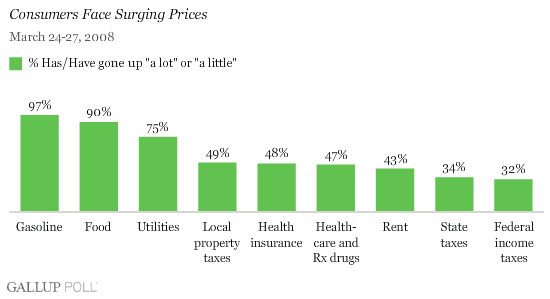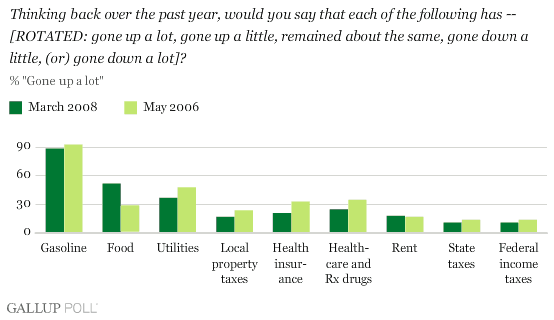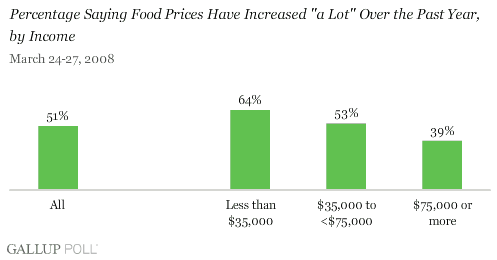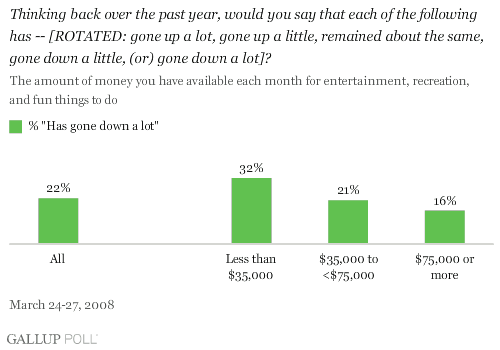PRINCETON, NJ -- Not surprisingly, virtually every American adult consumer says gasoline (97%) and food (90%) prices have increased over the past year, according to a Gallup Poll conducted March 24-27.

Soaring Prices May Be an Election Stealth Issue
During recent months, national attention has been focused on the evolution of the so-called "subprime" mortgage debacle into a global financial crisis. If it had not been for this historic crisis, public attention might have been more focused on surging prices and the impact they are having on the average American consumer. In fact, increasing inflation in terms of both gasoline prices and food prices could turn out to be a stealth issue in this year's elections -- nothing is closer to the consumer's pocketbook than the cost of these essentials.
That consumers have perceived and continue to perceive inflation as a problem may be best reflected in that about 90% in both May 2006 and March 2008 said gas prices at the pump had increased "a lot" during the previous year. But even as consumers report soaring gasoline prices once again this year, half also indicate that food prices have surged over the past year, compared to only about 3 in 10 two years ago.
On the other hand, and perhaps surprisingly, the percentage of consumers saying prices have increased "a lot" is down from 2006 levels in several areas, particularly in terms of what consumers pay for healthcare, health insurance, and prescription drugs. As a result, consumers may ultimately be more concerned about what they pay for groceries than what they must pay for healthcare during this election season.

Higher Food Prices Are a Regressive Tax
Over the past several years, it has become widely recognized that a surge in gas prices at the pump has essentially the same economic impact as a regressive tax. And while consumers of all incomes say gasoline prices have increased a lot over the past year, these higher prices are first felt by -- and place a disproportionately high burden on -- lower- and middle-income consumers.
Similarly, surging food prices have been felt most significantly by middle- and lower-income consumers over the past year. Sixty-four percent of those making less than $35,000 a year and 53% of those making $35,000 to $74,999 say the prices they pay for food and other groceries have gone up a lot over the past 12 months, compared to only 39% of those making $75,000 or more a year.

The Consumer Squeeze
One way consumers normally respond to higher costs for the essentials of daily life in modern America, such as food and gasoline, is to reduce their expenditures in other areas. For example, 50% of consumers say the amount of money they have had available each month for entertainment, recreation, and "fun things to do" has declined a lot (22%) or a little (28%) over the past year. While about half of those in all income groups say they have had to cut back on fun things, 32% of those making less than $35,000 a year say their money for such discretionary activities has gone down a lot over the past year, compared to 21% of those making $35,000 to $74,999 and only 16% of those making $75,000 or more.

Recession and Prices
Historically, a slowdown in the U.S. economy has had the positive effect of lowering consumer prices. In his recent testimony before the Congress, Federal Reserve Board Chairman Ben Bernanke suggested he thought that would be the case later this year. However, one might assume that if this supply-demand thesis was going to work, energy and gas prices at the pump would have already started to take a tumble.
At this point, it appears that globalization is having a major impact on all commodity prices, as is the substitution effect between growing crops for food and growing them for energy. One result might be that even as the U.S. economy continues to slow, the price of essentials such as gasoline and food may remain high or go even higher.
Restoring global financial stability is an obvious economic and political priority in the immediate term, but the surge in prices of everyday essentials in America should not be ignored. If these prices continue to increase even as the economy continues to slow, this potentially significant political and economic issue could emerge from stealth mode very suddenly.
Survey Methods
Results for this panel study are based on telephone interviews with 1,005 national adults, aged 18 and older, conducted March 24-27, 2008. Respondents were drawn from Gallup's household panel, which was originally recruited through random selection methods. The final sample is weighted so it is representative of U.S. adults nationwide. For results based on the total sample of national adults, one can say with 95% confidence that the maximum margin of sampling error is ±4 percentage points.
In addition to sampling error, question wording and practical difficulties in conducting surveys can introduce error or bias into the findings of public opinion polls.
